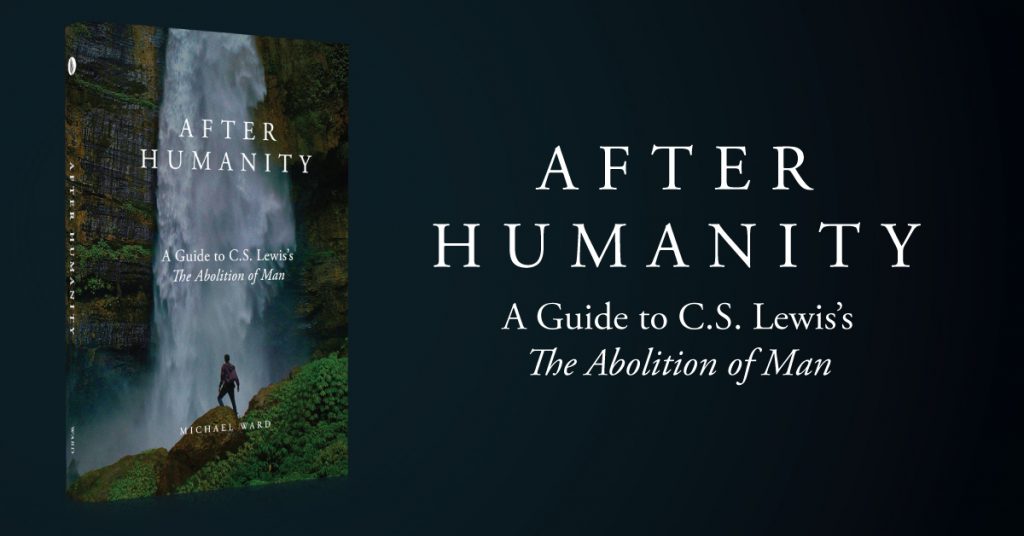One doesn’t normally review a book until one finishes it. I’m going to break that unofficial rule today because the value of Michael Ward’s new tome, After Humanity, is evident from the very first page.
The Abolition of Man is one of C. S. Lewis’s most insightful books. It’s also one of the most difficult to read because it originated in a series of scholarly lectures at the University of Durham in 1943. Children entranced by Narnia will never grasp this one. Even adults who have delved seriously into Lewis’s apologetic works—Mere Christianity, The Problem of Pain, and Miracles—may find The Abolition of Man to be painstakingly tough to follow at various points in his argument. Yet it is an argument that needs to be understood because it transcends the WWII era and has direct application to what we see in our culture today. In fact, I would assert that it is more applicable today than it was when Lewis delivered the lectures.
Ward wisely begins the book with a number of small chapters to set the stage for the intricacies of the substance that will follow. For instance, the first chapter, “Reception,” lets the reader know how well received the book has been over the decades since its publication. The footnotes throughout the book are invaluable, beginning on page 1 where Ward lets us know how well attended Lewis’s lectures were when he gave them. As an aside, a historian like me loves footnotes because you don’t have to flip to the back of the book for the information included therein. While Ward does use endnotes for quotes from Lewis’s other writings, the really useful info is at the bottom of each page.
Chapter two, “Occasion and Context,” provides exactly that: the status of WWII at the time and the intellectual background from which Lewis made his remarks, particularly singling out the philosophical school and the individuals within it that were the target of Lewis’s argument. This chapter helps the reader understand what irked Lewis and why he felt it so important to advance his views in this way.
“Overview,” the third chapter, gives readers the overall argument Lewis is making, with a summary of each of the three chapters in The Abolition of Man. Chapter four, “A Religious Work?” highlights Lewis’s philosophical approach that deviates from his usual distinctly Christian perspective. The goal, says Ward, is to show how there are universal concepts that appear throughout history and the various cultures. In fact, this is what Lewis does in the first few chapters of Mere Christianity. Ward notes,
Abolition could fairly be characterized as a profoundly religious argument, for behind the diversity of the moral traditions that he cites lies a strong, central, unifying principle—namely, objective value, a universally recognised moral code, which requires obedience from all human beings.
It is this recognition of objective value that precedes what we ordinarily call “religion” (Paganism, Judaism, Buddhism, Christianity, Islam, etc.). Recognition of objective value is a kind of ur-religion underlying them all, and indeed all traditional philosophies and coherently logical systems of thought whatsoever.
Ward traces Lewis’s educational development in “Background,” which is chapter five. Many Lewis readers don’t realize that his first degree at Oxford was in philosophy, not English literature. That training in philosophy stayed with him throughout his career and influenced everything he wrote. Abolition, as a supremely philosophical book, became, in Walter Hooper’s words, “an all but indispensable introduction to the entire corpus of Lewisiana.” Another book describes Abolition as “the lynchpin for understanding all of his work.” In Ward’s estimation, “Abolition might even be described as the philosophical theme of Lewis’s output and his other works as its variations. It begins to appear that Lewis favoured this slim yet weighty volume because it distils or foreshadows much of what most deeply concerned him through the rest of his writing career.”
The final introductory chapter, “Legacy,” shows how others have responded to Lewis’s thesis and how his concern that objective value was being dismissed is finding its way more and more into our world today.
Ward offers this analysis as to how Lewis’s warnings have come to fruition:
The pervasive, almost ubiquitous acceptance of various kinds of emotivism and subjectivism in modern Western culture means there can be no persuasion—that is to say, rational argument leading to a freely adopted change of mind. Rather, as belief in objective value evaporates and the public square is evacuated of practical reason, what passes for moral discourse increasingly resembles a war zone in which political propagandists, commercial interests, private whims, and animal instincts fight tooth-and-nail in a permanent free-for-all. …
In this rational desert the only way people can effect social or political or legislative change is to mobilise a sufficiently large contingent of like-minded protestors and out-protest their opponents. The question of truth, as such, is relegated to a second- or third-order issue: the real question is one of power. And thus we arrive at our post-truth world.
I’ve focused on these early chapters in this review because they are so significant. The rest of the book—the commentary on the specifics in each chapter of Abolition, would make this a review that might never end. I’ll just simply say it is a wealth of insight, definitions, and even further background for Lewis’s statements.
I have taught The Abolition of Man to university students every time I’ve offered my Lewis course. Each time I question whether I ought to include it because of its density, but I always conclude that it’s too important to omit. Michael Ward has now given me even more ammunition for ensuring that I never omit it. After Humanity is a must-read for all serious Lewis scholars.


